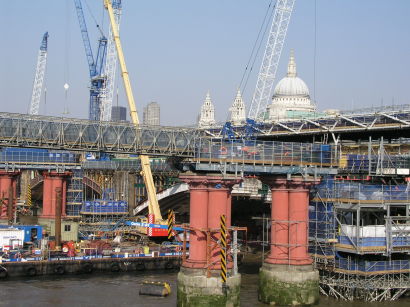A HOUSE of Commons Committee has produced a critical report about the Thameslink Programme, claiming that passengers will not see the benefits of the £7 billion project 'until the 2020s'.
The Public Accounts Committee highlights the fact that an upgrade of the north-south route through central London was first discussed in 1989, just after the tunnel between Farringdon and Blackfriars had been reopened to passenger trains for the first time since before the First World War.
Originally known as 'Thameslink 2000', the project was renamed after 2000 had come and gone without any noticeable developments on the route.
In recent years the Programme has picked up pace, with platforms being lengthened for 12-car trains at many outer suburban stations between Bedford and Brighton. Farringdon and Blackfriars have been rebuilt, while the former King's Cross Thameslink platforms have been replaced by a new low level station at St Pancras International.
The latest piece in the jigsaw is London Bridge, which will need five years to be rebuilt, and where work started in earnest after last year's Olympics, although a new concourse had already been completed there in time for the Games.
Rolling stock has been delayed by funding uncertainties which stem from the financial crisis in 2008-2009 and led to particular problems in the Eurozone.
Although German train-builder Siemens was controversially named as preferred bidder in June 2011, beating rival Bombardier which would have built the trains at Derby, the Siemens contract was only finally confirmed this summer. This means that the new Thameslink fleet will be several years late coming into service. This delay also has implications for newly-electrified lines elsewhere in the country, which are due to receive the present Thameslink rolling stock.
The DfT has had to plug this 'cascade gap' by ordering interim fleets of units via Southern, which are ironically being built by Bombardier in Derby. The arrival of these fleets will mean that at least some of the present Thameslink units can be refurbished and cascaded elsewhere from around 2015, although no dates have yet been set.
However, the delay has attracted sharp words from the Public Accounts Committee. It is chaired by Labour MP Margaret Hodge, who said: "The procurement of new trains through a £1.6 billion PFI deal [in 2006 prices] has taken over three years longer than expected. The planned completion date has been put back to 2018. But meeting the timetable for delivering the new trains will be very demanding and risky.
"We are also sceptical about using PFI to fund this project. It is alarming that the department compared the PFI option against only one other private sector option and did not construct a public sector comparator to understand better the relative costs, risks and rewards of choosing a PFI funding route over a public one."
The Government has since become cooler about using Private Finance Initiatives to fund new trains, and will be using public money for the £1 billion Crossrail fleet after first attempting a combination of a PFI and a public guarantee worth £350 million. This compromise was also later dropped in favour of wholly public funding.
A DfT spokesman responded: "As the committee acknowledges, the Thameslink programme will deliver much-needed additional seats for passengers by December 2018.
"Difficulties in the financial markets, caused in part by uncertainty regarding the euro, alongside the complexity of the deal and our drive to secure maximum value for the taxpayer, did lead to a delay in concluding the rolling stock contract but we remain confident that the trains will be delivered at the right time.
"Construction of the depots and manufacture of the new trains is on schedule."


